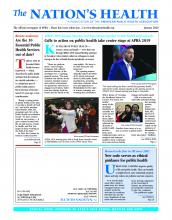Seriously ill Medicare patients often have trouble paying medical bills, a new study finds.
Published in the November issue of Health Affairs, the study found that 53% of seriously ill Medicare beneficiaries surveyed had a serious problem paying medical bills, with 30% reporting problems paying for prescriptions and 25% reporting difficulties with paying for hospital bills. Thirty-six percent said financial hardships related to their illnesses had eaten up most or all of their savings.
The results are based on responses from seriously ill Medicare patients collected during a phone survey in summer 2018.
“This paper is a total unexpected finding,” said study co-author and APHA member Robert Blendon, ScD, a professor of public health, and health policy and political analysis at the Harvard T.H. Chan School of Public Health. “Medicare is one of the most admired health plans in America, it’s a model for presidential candidates — we were expecting there’d be few financial problems.”
Originally, Blendon said he and his colleagues set out to explore problems that seriously ill Medicare patients face when it comes to delivery and coordination of care. He noted that seriously ill beneficiaries represent less than 1 in 5 Medicare patients, so they often get overlooked during research studies on the population. The financial hardship finding took researchers by surprise, he said.
In general, Medicare patients are satisfied with how the health system works, but the program has coverage gaps, such as having no cap on out-of-pocket spending. The study noted that 90% of Medicare beneficiaries also have supplemental health coverage.
“One of our conclusions was that the people we surveyed had no idea that they would have these financial problems,” Blendon told The Nation’s Health. “People need to be told whether the policy they have really protects them against serious illness, and it’s not something that people can always figure out by themselves.”
Among the 742 seriously ill Medicare enrollees who took the survey, 25% said medical costs were a major burden on their families, while 30% said they were a minor burden. A majority also said they relied on family or friends for help. Such caregiving put a “considerable strain” of those helping as well. Less than half of seriously ill respondents said health professionals adequately informed them about the costs that their insurance would cover.
“Medicare insurance is broadly popular, but seriously ill beneficiaries who most-need financial protection report widespread problems affording care and financial instability,” the study concluded.
Blendon said further investigation is needed to explain why seriously ill Medicare patients face such burdensome coverage gaps, especially as the nation’s aging population is only growing bigger.
“We absolutely have to find out why this is happening,” he said. “If we don’t, the number of people who find themselves with this problem will only grow.”
For more information on the study, visit www.healthaffairs.org.
- Copyright The Nation’s Health, American Public Health Association









